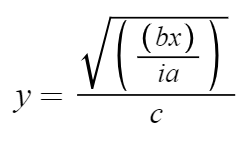Maximum Load: Difference between revisions
gdb>Cxejes mNo edit summary |
gdb>Cxejes mNo edit summary |
||
| Line 3: | Line 3: | ||
[[File:Max_load_eq_01.png|thumb|center|Scar size increase.]] | [[File:Max_load_eq_01.png|thumb|center|Scar size increase.]] | ||
With this data, we can deduce the point at which the oil film layer is able to fully withstand the pressures without breaking. This is typically referred to as "film strength". | |||
This rating typically varies from 15,000 PSI (poor) to 150,000 PSI (excellent). | This rating typically varies from 15,000 PSI (poor) to 150,000 PSI (excellent). | ||
Revision as of 20:00, 22 February 2021
The Maximum Load rating is mathematically derived from a number of factors, and is measured at the point when the scar size rate of increase is less than 0.01 mm/min. Most scar size increases can be expressed with the following equation:
With this data, we can deduce the point at which the oil film layer is able to fully withstand the pressures without breaking. This is typically referred to as "film strength".
This rating typically varies from 15,000 PSI (poor) to 150,000 PSI (excellent).

